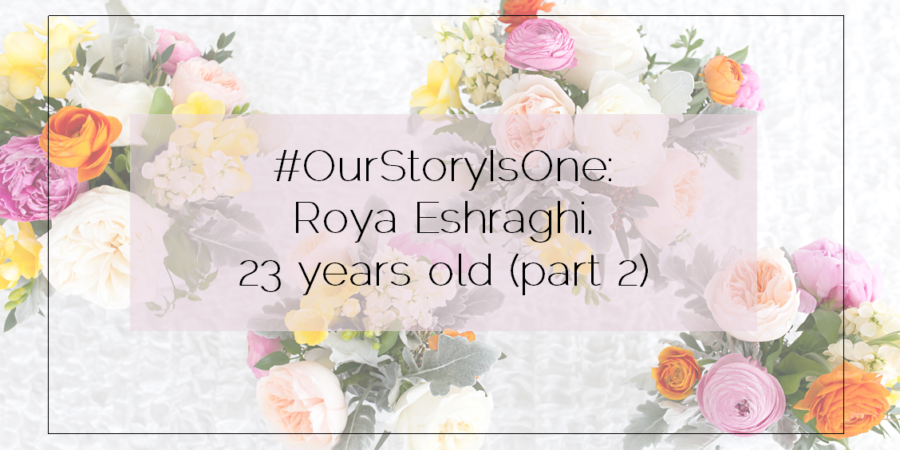After being arrested twice in a row in November 1982 (read part 1 our #OurStoryisOne here if you missed it), Roya and her mother were transferred from Sepah to Adelabad prison on 4 January 1983, with her father following some time later.
Roya was kind to all her fellow inmates regardless of their beliefs or the alleged “crimes”. There was a sickly old woman in prison nicknamed called Mama Maryam who had been charged with murder. Nobody visited her, so Roya went to her cell and took care of her. She fed her and even managed to get her medication. Mama Maryam later recovered and was released after being found innocent of her alleged “crimes”.
Because of her religious beliefs, the prison authorities considered Roya to be an unbeliever, and thus “unclean” and she was subjected to humiliating treatment similar to that of atheist political prisoners. Prison wardens refused to have any physical contact with her even when, for example, they were guiding her blindfolded to the interrogation room. In such cases, guards would give her the end of a folded newspaper and hold the other end, avoiding contact. To be honest, I’m kind of grateful for this belief, however ignorant it may be; it prevented other things from happening, let’s leave it at that.
Unfortunately, it didn’t prevent other forms of torture. It seems like the focus of the prison authorities was to convince the Eshraghis to recant their Faith. The Eshraghi family were blindfolded and interrogated together. By humiliating and insulting one member of the family, the interrogators tried to put pressure on other members. They often invented false quotations from one member of the family and told it to another member. On 2 December 1982, Roya was even subjected to a mock execution.
One day, when Roya was walking in the prison yard, a voice over the loudspeaker summoned her. The guards, who were standing close to her mother Ezzat, spoke in a way that Roya would hear them. They said that her mother had been taken to be whipped. They blindfolded Roya and took her to a room where they kept her for four hours while the interrogator repeatedly came to the room and threatened her with torture and execution. She was told that her parents had renounced the Bahá’í faith and if she did the same, all three of them would be released immediately. Spoiler alert: They were lying; the parents hadn’t recanted, and Roya didn’t recant, even when the interrogator threatened to whip her.
Roya was put on trial; her cellmate shares how Roya described the trial to her: “After the indictment was read, [Judge] Hojatoleslam Ghazaei asked me to choose between Islam and a death sentence. I smiled and said ‘I accept Islam but I am a Baha’i.’ ‘Get lost!’ the judge said angrily. I left, but suddenly I remembered that I had not said goodbye, so I opened the door again and said ‘Sorry, sir, to waste your time. Goodbye!’ Mr. Ghazaei became even angrier and as he was grinding his teeth he said ‘Get out! Out!’” I don’t know why, but the thought of a judge getting so worked up over a young woman’s politeness amuses me to no end.
On 16 June 1983, Roya’s father, aged 62, was executed by hanging, together with five other Bahá’ís. Two days later, during a visit, Roya and her mother learned about his execution. On their way back to the ward, Roya, her mother, and eight other Bahá’í women were separated from other prisoners and were told to board a minibus. They were taken to Chogan Square, where they were hung, one at a time. Roya was forced to watch as the other women were hanged. When her turn came, she was given a final chance to recant her faith; when she refused, she was hanged.
The authorities probably buried her along with the other executed Baha’is in the Baha’i cemetery of Shiraz, without washing her or observing any other burial custom. They also did not inform the rest of the family of her execution. Her family learned of the execution accidentally and was not allowed to bury her body.
Nahid Eshraghi, Roya’s sister, once said: “The news that my family, all three of them, have been executed together, was like my head had suddenly been hit with a sledgehammer. I could not eat for days. My body rejected everything and I was in total shock. But today, I feel better, because my family stood by their beliefs until the last moment of their lives and taught me, their children and thousands of others, to never submit to tyranny and injustice, even if one has to pay with their lives. Great causes demand great sacrifices.”
Four months after Roya’s execution, the Revolutionary Court confiscated her family’s home. Their remaining daughter appealed without success. In 1992, this house and few others around it were razed to the ground and the land sold. Currently a multi-story residential building – called the “Delta” building – stands on the confiscated land of Eshraghi family.
While the focus is on Roya and her mother, both of whom were imprisoned and executed together, I always pause to think about Rosita and what she must have gone through. Her three older siblings abroad and calling her over 1980s landlines, alone in her family home, dealing with an institution that was unkind, to say the least, towards Bahá’ís—it must not have been easy, being left behind, in so many ways. And so, a thought and a prayer always go to her, because although she wasn’t executed that day, in many ways, her life ended alongside that of her parents and sister.
Find my entire #OurStoryisOne project here. For more information, visit the official #OurStoryisOne website, here, or follow on Instagram.

